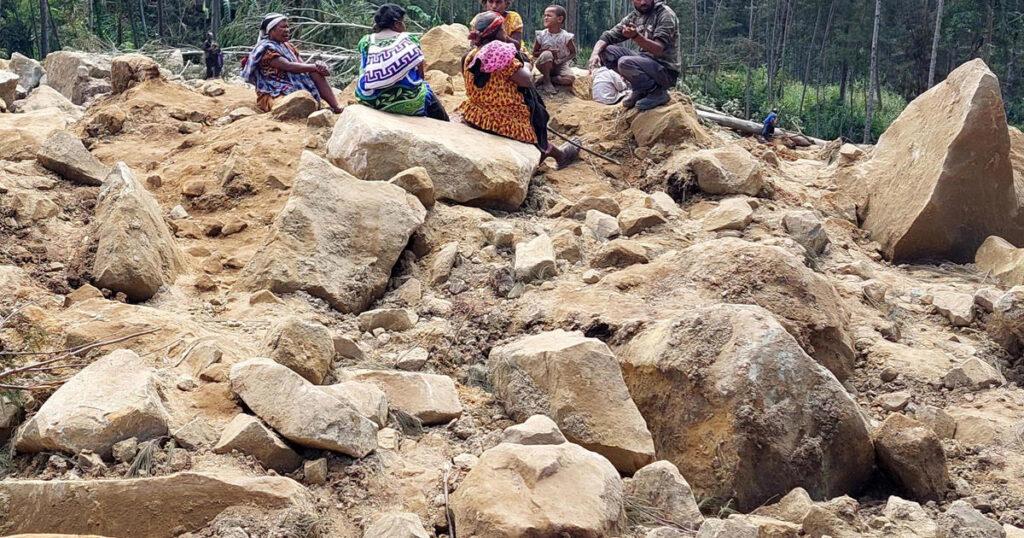Melbourne, Australia — The Papua New Guinea government Friday's landslide victory Over 2,000 people were buried alive and a formal request for international aid was made.
The government figures are The United Nations estimates that 670.
Only six bodies have been recovered so far.
STR/AFP via Getty Images
The once-bustling village in Enga province was nearly destroyed when part of Mount Mungaro collapsed in the early hours of Friday, burying homes and the people sleeping inside.
In a letter to the UN resident coordinator dated Sunday and seen by multiple media outlets, the acting director of the South Pacific island nation's National Disaster Center said the landslides had “buried more than 2,000 people alive” and caused “extensive damage.”
“The landslides have caused extensive damage to buildings and gardens and have had a major impact on the country's economic infrastructure,” the letter said, according to AFP news agency.
The letter also said the main road to the Porgera gold mine was “completely blocked.”
Casualty estimates have fluctuated widely since the disaster and it was not immediately clear how authorities came to calculate the new number of victims.
Australia was preparing to send aircraft and other equipment to the site of the landslide on Monday as overnight rains in the country's mountainous interior raised concerns that tons of rubble burying villagers could become dangerously unstable.
Australian Defense Minister Richard Marles said Australian authorities had been in talks with their Papua New Guinean counterparts since the landslide occurred on Friday.
“The exact nature of the assistance we will provide will become clearer over the next few days,” Marless told the Australian Broadcasting Corporation.
“We clearly have the airlift capability to get people there, and we may also have other equipment that can be brought in in terms of search and rescue (and other issues). We are in discussions with Papua New Guinea right now,” Mares added.
Papua New Guinea is Australia's closest neighbor and the two countries are building closer defense ties as part of Australia's efforts to counter growing Chinese influence in the region. Australia is also the former colony's most generous donor of foreign aid, having gained independence in 1975.
Heavy rain fell for two hours overnight in the provincial capital, Wabag, 35 miles from the devastated village. Weather reports were not immediately available from Yambari, where communications are limited.
But emergency responders were concerned about the impact of rain on already unstable piles of rubble that lie 20 to 26 feet deep over an area the size of three to four football fields.
The excavator, donated by a local construction company on Sunday, was the first of the heavy machinery brought in to help villagers who have been digging with shovels and farm tools to find bodies, working dangerously around the still-shifting rubble.
STR/AFP via Getty Images
Serhan Aktoprak, the U.N. International Organization for Migration representative in Papua New Guinea, said water was seeping between the rubble and the ground below, raising the risk of further landslides.
He said the weather situation in Yambari would not be known until Monday afternoon.
“What I'm really worried about personally is the weather, the weather, the weather,” Aktoprak said, “because the land is still sliding. Rocks are falling.”
Papua New Guinea's Defense Minister Billy Joseph and Raso Mana, director of the government's National Disaster Centre, flew in an Australian military helicopter from the capital Port Moresby to Yambali, 370 miles northwest, on Sunday to see first-hand what is needed.
STR/AFP via Getty Images
Mana's office posted a photo of him handing over a cheque for 500,000 kina ($130,000) to local officials in Yambari to purchase emergency supplies for 4,000 displaced survivors.
Earth-moving equipment used by the Papua New Guinea military was being transported to the disaster site 250 miles from the east coast city of Lae.
Officials said traumatised villagers were divided over whether to use heavy machinery to dig up the bodies of their buried relatives, potentially damaging them further.


